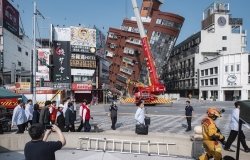"Sugar Daddy Blues": Japan's Approach to Building Peace in Afghanistan
Kuniko Ashizawa, Oxford Brookes University, and Japan Scholar, Woodrow Wilson Center
Overview
Kuniko Ashizawa, Oxford Brookes University and Woodrow Wilson Center Japan Scholar
Japan's 2009 pledge of U.S. $5 billion in aid over five years has made it the second largest donor to "peacebuilding" efforts in Afghanistan. What are the origins of Japan's growing activism in international peacebuilding over the past decade, and what are the characteristic features of Japan's overall approach toward international peacebuilding? How has Japan constructed its approach towards its ongoing reconstruction assistance to Afghanistan and surrounding areas? Are Japan's peacebuilding activities effective in terms of their contribution to overall peacebuilding efforts of both international actors and recipient countries? Wilson Center Japan Scholar Kuniko Ashizawa, professor of international relations at Oxford Brookes University, considered these questions at an event hosted by the Asia Program on December 14.
According to Ashizawa, Japan's commitment to peacebuilding efforts in Afghanistan is unusual, given Tokyo's traditionally passive stance in foreign affairs. Constitutional limitations on the use of force and popular suspicion of military institutions since Japan's devastating defeat in the Second World War have constrained Tokyo's responses to calls for international solutions to conflict situations. However, awareness in Japan of the need to contribute more to international efforts to maintain the peace has been growing since the 1991 Gulf War, when overseas commentators either ignored Japan's massive but almost purely financial contribution to United Nations efforts to roll back Iraq's invasion of Kuwait, or criticized such efforts as mere "checkbook diplomacy." In the following decade, then, Japan became increasingly involved in peacebuilding missions where its officials could play a proactive role on the ground in post-conflict situations while carefully avoiding military solutions to international problems that might invite domestic criticism.
Recent problems in the alliance relationship between the United States and Japan have also informed the latter's peacebuilding policy on Afghanistan. In 2009, a newly elected government centered on the Democratic Party of Japan (DPJ) enraged alliance managers in Washington by attempting to reopen negotiations over the relocation of a U.S. base on Okinawa. The DPJ also brought home Japanese Self Defense Forces (SDF) ships which had been refueling the vessels of other nations involved in operations in Afghanistan. Japan's initial decision in 2001 to initiate the SDF refueling mission as well as to commit $1.8 billion in total to efforts in Afghanistan between 2001 and 2009 was a way of showing Japanese solidarity with the United States after the terrorist attacks of September 11, 2001. Many commentators in Washington believed that the DPJ's actions were a snub to U.S. interests. Japan's $5 billion pledge can therefore easily be interpreted as an attempt to patch up relations with the United States.
Nevertheless, the renewed financial commitment to peacebuilding efforts in Afghanistan will likely be focused in areas where Japan already has established a presence. Japan has been particularly prominent in the demobilization, disarmament, and reintegration (DDR) of Afghan national forces between 2001 and 2006 and projects ongoing since 2006 leading to the disbanding of illegal armed groups (DIAG). Tokyo is working to develop DDR in particular as its own niche activity, as it allows Japan to make a contribution to peacebuilding activities without any need to use military force or cooperate with the militaries of other nations, thus avoiding political fallout at home.
Despite some criticism, Japan's reconstruction efforts in Japan have served the Japanese national interest well. Although it has not sent forces to serve on the ground, Japan has not been criticized for resuming its old "check-book" diplomacy, and has even received due appreciation from its most important ally, the United States, as well as from other countries, most importantly Afghanistan itself. It has also been able to present itself as committing seriously to international peace and security, and has continued to frame "international peacebuilding" as one of its key foreign policy agendas.
At the same time, however, Ashizawa pointed out that because of the $5 billion pledge, Japanese officials are now increasingly preoccupied with finding projects to spend the funds rather than concentrating on using them efficiently. Often this means that Japanese agencies are even more eager to pour funds into United Nations agencies as an easy way of meeting budget targets. This will only serve to aggravate existing criticism from Western diplomats and aid-agency officials, academics specialized in Afghan reconstruction, and Afghan government officials, especially those from Ministry of Finance, that Japan relies too heavily on the UN to achieve its goals. Tokyo is aware of such criticism and is actively seeking to expand Japanese activities in Afghanistan to include more joint projects with other donor nations, particularly the United States. However, according to Ashizawa, Tokyo often undertakes these projects based on the desire to forge good relationships with these nations. Whether Japan's focus will be on increased reliance on the United Nations to achieve its contribution targets, or greater cooperation with other nations to deepen bilateral relationships, there is, according to Ashizawa, no conscious effort to strategize how to use the $1 billion per year most effectively to achieve the supposed ultimate goal—peacebuilding in Afghanistan.
By Bryce Wakefield
Robert M. Hathaway, Director, Asia Program
Hosted By

Indo-Pacific Program
The Indo-Pacific Program promotes policy debate and intellectual discussions on US interests in the Asia-Pacific as well as political, economic, security, and social issues relating to the world’s most populous and economically dynamic region. Read more
Thank you for your interest in this event. Please send any feedback or questions to our Events staff.










